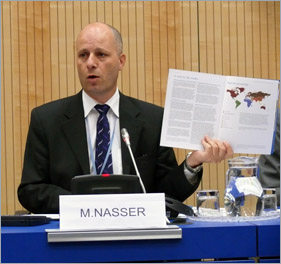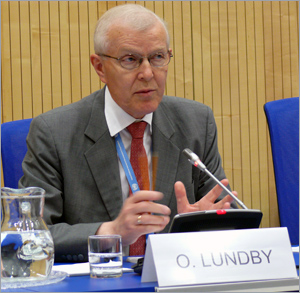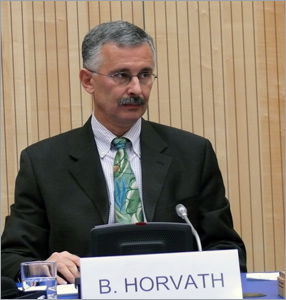 At a press briefing in Vienna on the day of the launch of the Millennium Development Goals Report 2010 the UNIS Vienna Director, Maher Nasser outlined the progress that is being made towards achieving the MDGs and also highlighted areas where more action is needed if they are to be met in five years time.
At a press briefing in Vienna on the day of the launch of the Millennium Development Goals Report 2010 the UNIS Vienna Director, Maher Nasser outlined the progress that is being made towards achieving the MDGs and also highlighted areas where more action is needed if they are to be met in five years time.
In his presentation Mr. Nasser set out in detail, using data from the new report, progress towards reaching the MDGs. Despite recent setbacks, the world is still on track to meet the poverty reduction target and poverty would have decreased further still had it not been for the global financial crisis, he said.
On the positive side, enrolment in primary education was increasing although it is still 10 per cent off being universal but abolishing school fees in some countries like Burundi has tripled the numbers going to school. There has been remarkable success in reducing deaths from malaria and substantial progress in reducing child deaths. While the spread of HIV has stabilized, the number of new infections continues to outstrip the expansion of treatment.
Clean drinking water is still a luxury for a great number of people around the world Mr. Nasser said but the MDG target of halving the number of people without sustainable access to safe drinking water and basic sanitation now seems to be within reach.
Mr. Nasser said highlighted that almost half the world's population did not have access to basic sanitation and he quoted from a UN University study which showed that more people in India have access to a mobile phone than to a toilet.
Mr. Nasser also spoke of the uneven access to services particularly the discrepancies between rural and urban populations, women and men, and rich and poor.
He stressed the importance of developed countries doing more to achieve the MDGs in particular by meeting their commitment to increase official development assistance (ODA) and fair trade. Of all the donor countries, the target of 0.7 per cent of GDP has been met by only five countries - Denmark, Luxembourg Netherlands, Norway and Sweden in 2009.
 Special Adviser to the Director-General of the United Nations Industrial Development Organization (UNIDO) Ole Lundby told the briefing that it was not surprising that the report described setbacks as a result of the financial crisis and that the road ahead would not necessarily be smooth either.
Special Adviser to the Director-General of the United Nations Industrial Development Organization (UNIDO) Ole Lundby told the briefing that it was not surprising that the report described setbacks as a result of the financial crisis and that the road ahead would not necessarily be smooth either.
From the perspective of UNIDO economic growth was vital to poverty reduction and sustainable development Mr. Lundby said. In terms of the MDGs UNIDO is focused on poverty reduction (Goal 1), empowering women (Goal 3), environmental sustainability (Goal 7) and developing a global partnership for development (Goal 8).
To help reduce poverty UNIDO helps to develop entrepreneurs in developing countries and training people in agribusiness. It has special programmes to help the economic empowerment of women as well as mainstreaming gender equality in its work. UNIDO also helps to develop cleaner industrial production he said.
Most of the MDGs, he said are social goals with little mention of economic growth. Looking head Mr. Lundby said the goal should be to develop the capacity of developing countries for sustainable economic growth so that they can pay for their own social sectors such as health and education.
He suggested looking at what has made some countries successfully become medium developed countries from being developing countries such as in East and South Asia and some in Africa and learn the lessons from their successful development strategies.
The UNIS Director picked up on the last comment of Mr. Lundby to highlight the 8 actions outlined in a report published by the United Nations Development Programme (UNDP) earlier this month, An International Assessment - what will it take to achieve the MDGs by 2015?, such as supporting country-led development, fostering inclusive economic growth, increasing public investment in education, health, water and sanitation and infrastructure, scaling up targeted interventions, including social protection and employment programmes, investing in women and girls, enhancing access to alternative energy and promoting low-carbon development, accelerating domestic resource mobilization to finance the MDGs and delivering on ODA commitments and improving its predictability, effectiveness, division of labour and disbursement modality.
The Poverty Reduction Practice Leader from the UNDP Regional Centre for Europe and the CIS, Balazs Horvath told the briefing that he saw the MDGs as a set of broad priorities for human-based development which were all interlinked and focused on outcomes. Mr. Horvath spoke of the critical need for political will to achieve the MDGs and of the need to look at what will happen after 2015 - the deadline for achieving them.

In terms of the region that he works in - Central and South East Europe and the CIS states and Georgia, he said it has a wide range of development - from countries like Slovenia with similar living standards to Austria, to Tajikistan which is more comparable with sub-Saharan Africa. The region had been very hard hit by the global financial crisis - more so than any other region of the world - and the effects would last for several more years.
Poverty has increased in the region and levels of inequality have shot up which has social implications he said. Food security is an issue in some countries in Central Asia and we need to raise agricultural productivity, address the system of land tenure and look at the problem of water availability.
There was a clear need for countries to have a coherent prioritized national development strategy, with a budget Mr. Horvath said.
The amount of development aid was probably not going to double by 2015 he said so it was important that the aid money was used more efficiently with donors coordinating efforts better and looking at new donors from the private sector and middle income countries such as China, Russia and India.
In response to a question Mr. Lundby denied that the goals had been set too high. "A starving child does not have a lot of patience," he said. The developed countries had to keep their promises by transferring resources to developing countries and the developing countries have to ensure good governance and good leadership. The UNIS Director also stressed that in addition to improving aid effectiveness, there was a need to eliminate corruption and waste to ensure that aid was better used. Mr. Lundby also said there was sometimes a lack of a holistic approach to the goals - failing to see them as interdependent which did not help, he said.
The role of the private sector and NGOs was stressed by Mr. Horvath in answer to a question about the role of fair trade. The poor had been hit disproportionately by the global financial crisis and were the most vulnerable with no cushion to fall back on so it would take a long time for the poorest to recover.
Asked about the effects of colonialism Mr. Lundby and Mr. Nasser spoke about the negative and divisive effects still felt in many countries due to the legacy of colonialism. Several conflicts, such as the one that engulfed Rwanda in 1994 could be seen as part of that legacy, Mr. Lundby said. However, it was important now to be forward looking and to learn from the positive example of Rwanda which in spite of that terrible event, the country was experiencing amazing development. He said we should look at why it is working there and look at good governance and leadership.
More information on the Millennium Development Goals and the Report.